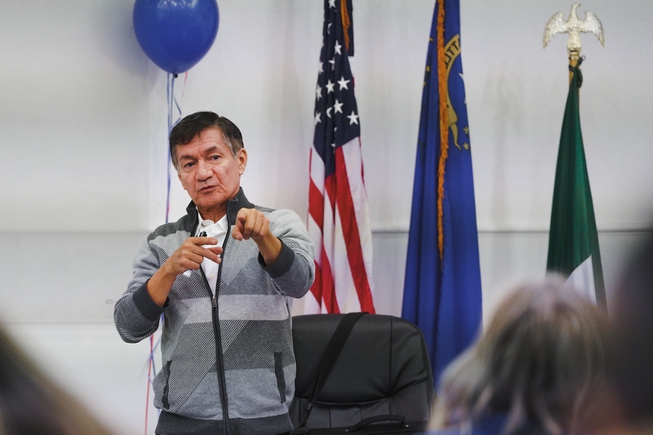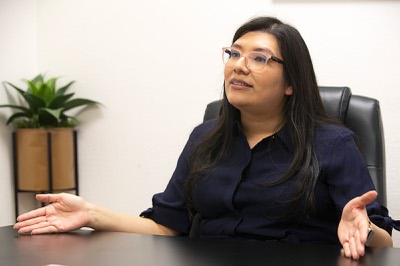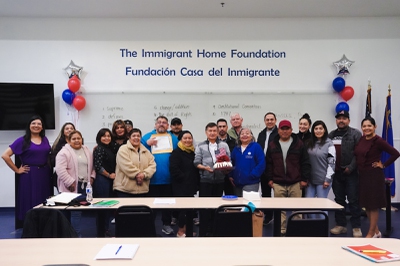
Brian Ramos
William H. Ortiz makes a point Thursday at the Immigrant Home Foundation where he teaches a course that prepares aspiring citizens for their required interview. The Immigrant Home Foundation, 2900 Stewart Ave., provides immigrants with resources and referrals to resolve immigration issues, pursue citizenship and more. Ortiz is a stellar example for his students; earlier Thursday he was sworn in as a new citizen of the United States.
Monday, Jan. 30, 2023 | 2 a.m.
Immigration in Las Vegas
In a classroom one evening last week at the Immigrant Home Foundation, instructor William H. Ortiz held up his U.S. certificate of citizenship to raucous applause from his pupils.
Ortiz, who teaches a course in Spanish that prepares aspiring citizens for their required interview, had been sworn in as a citizen himself mere hours earlier — in a ceremony at the local U.S. Citizenship and Immigration Services field office with dozens of others, all waving mini-American flags.
“I was very excited because I remember when I was a teenager, (it) was my dream,” said Ortiz, a 60-year-old priest who was born in Colombia and came to the U.S. seven years ago from Italy. “ … Sometimes I would like to go to America. And after 40 years, finally, I’m here.”
The Immigrant Home Foundation, 2900 Stewart Ave. in East Las Vegas, has been recognized by the U.S. Department of Justice for providing immigrants with resources and referrals to resolve immigration issues, pursue citizenship and more.
The foundation’s community outreach director, Janette Amador, says the nonprofit organization assists immigrants with petitions for their families to come to the U.S., waivers for those who may be in violation of immigration law, consular processes for those not qualified for a green card and coordinates with law enforcement to provide immigration relief for victims of domestic violence.
She also estimates the organization has helped 3,000 applicants to Deferred Action for Childhood Arrivals (DACA).
“We’d love to be able to reach as many people in our community as possible, because we want them to be able to have access to the services that we offer — to be able to have access to a credible organization in the community,” Amador said. “Someone that is going to be able to serve them, and not take advantage of them.”
The Immigrant Home Foundation values education, Amador said, and offers a citizenship course like Ortiz’s four times a week, as well as at least one informational session a month. The organization pushes citizenship because — while a work permit must be renewed regularly and a green card is valid for only 10 years before renewal — citizenship is permanent, Amador said.
Immigration and service fees required of noncitizens are a continuous financial burden, Amador added, with a green-card renewal alone costing $540.
Most importantly, she said, citizenship gives people the right to vote.
“They have been living here for 20 to 30 years without a voice,” Amador said of many people pursuing citizenship at the Immigrant Home Foundation. “So, by being able to become a citizen, they have that opportunity to be able to have a say, and to vote and to express their opinions.”
The road to citizenship is not an easy one, however, Amador said. In addition to exorbitant costs — the citizenship processing fee is $725 — and language barriers, the biggest bump in the road for immigrants pursuing permanent status is misinformation, Amador said.
The process is extremely complex, she said, and many people spend decades pursuing citizenship. The Immigrant Home Foundation works to make people aware if citizenship is an option or if it’s not and keep them from falling prey to people who would take advantage of their lack of awareness and charge them for unnecessary services.
To combat misinformation, Amador said a good rule of thumb for immigrants was to consider if the information being provided sounds “too good to be true.” If it is, she said, get a second opinion.
“They have to be able to obtain information from a trusted source,” she said.
The first step when someone decides to file for citizenship is to review their eligibility — including their age, green-card or marital status and “good moral character,” Amador said.
Next comes the 20-page application, which asks a variety of questions about the last five years of the applicant’s life, such as where they have lived, worked, traveled and if they have been arrested or guilty of immigration violations.
The final hurdle is the interview, Amador said. In the courses at the Immigrant Home Foundation, citizenship hopefuls study a list of 100 questions on topics of U.S. history, geography and more, as well as practice their English.
During an immigrant’s interview with an officer from U.S. Citizenship and Immigration Services, Amador said, they are asked a random set of 10 of those questions and must answer at least six correctly.
Describing his official interview experience to his class Thursday night, Ortiz said he was asked questions like, “What is the national anthem?”, “Who is Susan B. Anthony?” and “Who controls the executive branch?”
To see people like Ortiz work toward and eventually achieve citizenship over several years — from “zero to citizen,” Amador said — is extremely rewarding.
“I love being able to see that I was able to help someone file for their first work permit, and then file for their green card and then finally receive their citizenship,” Amador said. “That gives me so much satisfaction, that I can’t even explain — I can’t even fit into words.”
The Immigrant Home Foundation has served people from about 70 different countries, Amador estimated. The majority of its patrons are Latino, and every employee speaks English and Spanish, she said.
“The Immigrant Home Foundation is a place where we want all immigrants to feel welcome,” Amador said. “We want them all to feel at home. We want them all to feel that they can come to us with whatever need that they have.”
Among other educational opportunities and pro bono advice from attorneys for immigrants, the organization also responds to any needs that may arise in the community, Amador said.
She pointed to the Immigrant Home Foundation’s help with vaccines during the COVID-19 pandemic, connecting people to funds for housing and hosting food drives.
“We do as much as we can with the resources that we have, and we’re always fighting to find more resources to provide more aid to our community,” Amador said.
After his class Thursday night, which included pizza and a cake with an American flag affixed to it to celebrate his new citizenship status, Ortiz emphasized that the Immigrant Home Foundation was not just a casa or “house” for immigrants, but a home made up of immigrants.
“It’s for them — for me,” he said. “It’s a family. They are a family.”


